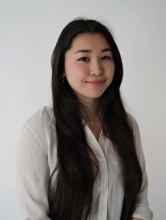
Monet Takeda is a graduate student in NYU’s Performing Arts Administration Program (PAA). She discussed her background, her segue to PAA, and what she has accomplished so far at NYU.
What inspired you to pursue Performing Arts Administration?
I grew up playing the violin. I started when I was three and pursued a violin performance degree in undergrad at Indiana University. I realized during that time that a performance career just wasn't for me.
I ended up doing a double major in business and violin and was introduced to arts administration, which immediately piqued my interest. I wanted to learn more about it.
I looked into some arts administration programs and NYU was my top choice. After speaking to friends with similar backgrounds, I learned that the program at NYU is more immersive than theory based. I wanted to be in the thick of it and felt this program would allow that as it is located in the heart of NYC. I wanted to attend shows and concerts, to have immediate access to leaders in the arts, and to pursue high-quality internships. NYU’s program offered all of this and more.
You recently co-moderated an industry panel event regarding sustainability for the Performing Arts - please talk more about this?
I'm currently a graduate assistant in PAA. Our team planned a panel event for the students that included some of the most prominent industry leaders from a variety of arts institutions around New York City.
Linda Shelton, Executive Director of The Joyce Theater and a faculty member of PAA, hosted the panel, which included: Melique Jones, CPO of Lincoln Center, Anna Glass, Executive Director of Dance Theatre of Harlem, Caylin Waller, a PAA alumnus and co-founder of Theatre Advocacy Project, and Jennifer Anglade, CFO of the Brooklyn Academy of Music.
It was such an honor to host these women and have them share their stories and experiences. It was important for us to hear their perspectives as they have the careers we, as students, are aspiring to. The panel opened our eyes to the entire arts industry. Overall, I thought the panel discussion was a huge success, especially the Q&A session that allowed students to directly interact with the speakers.
What are you working on now?
The PAA team is organizing a holiday social gathering for the Program. Our courses are delivered in such a way that first-year and second-year students don't get to interact often. We’re trying to create an event where both cohorts can mingle and network.
One of the things I love about PAA are the people. They are kind, creative and warm. It’s very rewarding to get to know and work with like-minded individuals and I’m excited to help plan events to bring everyone together.
What are your post-grad plans?
There are so many different areas of arts administration that people can pursue, including: marketing, finance, artistic planning, development, and more. At first I was overwhelmed by the amount of choices I had.
Initially, I did not want to work in development, because I thought it would just be fundraising. After taking the Development in the Performing Arts course (taught by a professor I greatly admire, Kirsten Munro), I changed my mind. I learned how essential development is to the industry, and how it’s about building connections and relationships with people that care about the arts, and I love that.
Right now I want to pursue a career in development in either corporate relations or institutional support. I'm interested in the relationships between corporations and foundations, and the way these institutions contribute to the industry’s sustainability.
What advice do you have for people who are considering a degree in PAA?
Keep an open mind about what you want to pursue within arts administration. A lot of people in this program, like myself, come from a performance background rather than a business background. At first, the choices can feel a little overwhelming, but they might be like me and discover something they’ve never considered before. I recommend to remain open to all opportunities because New York City - and NYU - offer such a wide range of possibilities.
